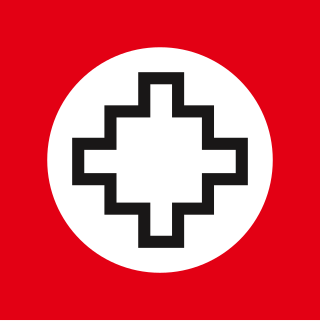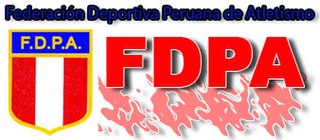A think tank, or policy institute, is a research institute that performs research and advocacy concerning topics such as social policy, political strategy, economics, military, technology, and culture. Most think tanks are non-governmental organizations, but some are semi-autonomous agencies within government or are associated with particular political parties, businesses or the military. Think-tank funding often includes a combination of donations from wealthy individuals and personal contributions, with many also accepting government grants.

The Ethnocacerist movement is a Peruvian ethnic nationalist movement seeking the establishment of a proletarian dictatorship led by the country's Indigenous communities and their descendants. It draws on the history of Indigenous and anticolonial movements, including those of Juan Velasco Alvarado, Evo Morales, Abdel Nasser, Muammar Gaddafi and Che Guevara. It is considered an Indigenist ideology.

Revolutionary Democratic Action, was a political party in Peru, active in the 1950s. Its president was Carlos Guija.

Jesús María is one of the most centrally located districts of Lima, Peru. It is an upper class, high-density district and it usually ranks in the top districts with the best quality of life in Peru with an HDI of 0.8372 (2019), only behind the districts of La Molina and Lince.

The FAES is a Spanish think tank. It is a non-profit liberal-conservative organisation with strong links to the Popular Party (PP); it is even known informally as the "People's Party think-tank". Its headquarters are in Madrid. Each year, the FAES publishes a Report on Activities, which can be downloaded from its website.

The Machu Picchu Scientific Base is a Peruvian polar scientific research facility in Antarctica, established to conduct Antarctic research on geology, climatology and biology. More specifically, its purpose is to study the continent's geological past, potential sea resources, wind strengths, air pollution, and the animal adaptation in a freezing environment. The base is named after the World Heritage site Machu Picchu.
As of 2018, official statistics showed 201,993 Peruvian-born residents in Spain. Out of these, 129,344 were Spanish citizens and 72,649 had not yet acquired Spanish citizenship. As of 2019, the number had increased to 218,129.
The Institute for Political Studies of the Catholic University of Portugal is a Portuguese research institution focusing on political science and political philosophy. It was created on 1 September 1997, at the Lisbon campus of the Catholic University of Portugal. The IEP was the only Portuguese think tank to get nominated for the top Think Tanks of World, according to The Global "Go-To Think Tanks": The Leading Public Policy Research Organizations in the World, 2008, published by the Think Tanks and Civil Societies Program of the University of Pennsylvania.

The Committee on Sustainability Assessment (COSA) is a global consortium of development institutions that work collaboratively to advance sustainability learning with its systematic and science-based measurement. COSA applies a pragmatic and collective approach for using scientific methods to develop indicators, tools, and technologies to measure the distinct social, environmental, and economic impacts and are applied in performance monitoring, evaluation, ROI calculation, and impact assessment. COSA has a public mission to open its scientific methods and metrics up to widespread use.

Programa Nacional de Población was a program conducted in Peru in the early 1990s to reduce population growth as a way of meeting international demographic standards. Plans for the "total extermination" of impoverished Peruvians through sterilization were included in Plan Verde, a covert military operation created to establish a neoliberal military junta. Compulsory sterilization, which is a method that forces individuals to partake in sterilization operations, was the main method employed by the Peruvian government to decrease population.

The Peruvian Athletics Sport Federation (FDPA) is the governing body for the sport of athletics in Perú.

Marayniyoq or Marayniyoc is an archaeological site in the region of Ayacucho in Peru. It lies southeast of the town of Huanta and southwest of Huamanguilla at the border of the Huanta Province, Huamanguilla District and the Huamanga Province, Pacaycasa District in a plain called Vega Pampa. It is considered a Wari site.
Cynthia McClintock is a professor at George Washington University and an author. She serves on the Center for International Policy's board of directors. From 1994–1995 she was the president of the Latin American Studies Association. She is an expert on Peruvian relations with the U.S., Andean affairs, the drug trade, and the Tupac Amaru rebel group.

Gastón Antonio Zapata Velasco is a Peruvian historian, professor and columnist, known for his investigations and articles about the history and sociopolitical reality of Peru.
M. Cristina Alcade is a Marie Rich Endowed Professor of Women's and Gender Studies at the University of Kentucky. She is also the Associate Dean of Inclusion and Internationalization in the College of Arts and Sciences at the university. She is also an affiliate faculty member in the Social Theory, Latin American, Caribbean, and Latino Studies, and Anthropology departments and works with the Center for Research on Violence Against Women. Her research focuses on gender violence, migration, exclusion, and race and racialization.
Julio Cotler was a Peruvian anthropologist, sociologist and political scientist. He was director of the Institute of Peruvian Studies and professor at the National University of San Marcos.

The Elcano Royal Institute for International and Strategic Studies is a think tank based in Madrid, Spain.

Clodoaldo Soto Ruiz is a Peruvian scholar, author and former Quechua professor at the University of Illinois at Urbana–Champaign.
Since the previous elections in 2016, polling companies have published surveys tracking voting intention for the 2021 Peruvian general election. The results of these surveys are listed below in reverse chronological order. The first round of the election was held on the 11th of April, and the run-off between Keiko Fujimori and Pedro Castillo is to be held on the 6th of June 2021.

The Charaña Accord, also known as the Hug of Charaña or the Act of Charaña, is the name given to an unrealized treaty that was discussed between the dictators of Bolivia and Chile, Hugo Banzer and Augusto Pinochet respectively. These discussions took place mostly on the Bolivian train station of Charaña on February 8, 1975, and included the brief reestablishment of diplomatic relations between the two nations which had been severed on 1962 because of the Atacama border dispute which was to be solved via a Chilean proposal for the exchange of territories between Bolivia and Chile, with the former receiving a corridor to the Pacific Ocean which would provide it with access to the sea and Chile receiving an equivalent amount of territory from Bolivia along its border with Chile.













